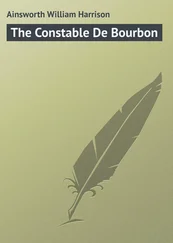W. Ainsworth - Rookwood
Здесь есть возможность читать онлайн «W. Ainsworth - Rookwood» весь текст электронной книги совершенно бесплатно (целиком полную версию без сокращений). В некоторых случаях можно слушать аудио, скачать через торрент в формате fb2 и присутствует краткое содержание. Жанр: Старинная литература, на русском языке. Описание произведения, (предисловие) а так же отзывы посетителей доступны на портале библиотеки ЛибКат.
- Название:Rookwood
- Автор:
- Жанр:
- Год:неизвестен
- ISBN:нет данных
- Рейтинг книги:4 / 5. Голосов: 1
-
Избранное:Добавить в избранное
- Отзывы:
-
Ваша оценка:
- 80
- 1
- 2
- 3
- 4
- 5
Rookwood: краткое содержание, описание и аннотация
Предлагаем к чтению аннотацию, описание, краткое содержание или предисловие (зависит от того, что написал сам автор книги «Rookwood»). Если вы не нашли необходимую информацию о книге — напишите в комментариях, мы постараемся отыскать её.
Rookwood — читать онлайн бесплатно полную книгу (весь текст) целиком
Ниже представлен текст книги, разбитый по страницам. Система сохранения места последней прочитанной страницы, позволяет с удобством читать онлайн бесплатно книгу «Rookwood», без необходимости каждый раз заново искать на чём Вы остановились. Поставьте закладку, и сможете в любой момент перейти на страницу, на которой закончили чтение.
Интервал:
Закладка:
"I'm dumbfounded," roared the dummerar, "if he can't patter romany 8as vel as the best on us! He looks like a rum 'un."
"And a rum 'un he be, take my word for it," returned the whip-jack, or sham sailor. "Look at his rigging—see how he flashes his sticks 9—those are the tools to rake a tree-decker. He's as clever a craft as I've seen this many a day, or I'm no judge."
The women were equally enchanted—equally eloquent in the expression of their admiration.
"What ogles!" cried a mort.
"What pins!" said an autem mort or married woman.
"Sharp as needles," said a dark-eyed dell, who had encountered one of the free and frolicsome glances which our highwayman distributed so liberally amongst the petticoats.
It was at this crisis Dick took off his hat. Cæsar betrayed his baldness.
"A thousand pities!" cried the men, compassionating his thinly covered skull, and twisting their own ringlets, glossy and luxuriant, though unconscious of Macassar. "A thousand pities that so fine a fellow should have a sconce like a cocoa-nut!"
"But then his red whiskers," rejoined the women, tired of the uniformity of thick black heads of hair; "what a warmth of colouring they impart to his face, and then only look how beautifully bushy they make his cheeks appear!"
La Fosseuse and the court of the Queen of Navarre were not more smitten with the Sieur de Croix's jolly pair of whiskers.
The hawk's eye of Turpin ranged over the whole assemblage. Amidst that throng of dark faces there was not one familiar to him.
Before him stood the upright man, Zoroaster (so was he called), a sturdy, stalwart rogue, whose superior strength and stature (as has not unfrequently been the case in the infancy of governments that have risen to more importance than is likely to be the case with that of Lesser Egypt) had been the means of his elevation to his present dignified position. Zoroaster literally fought his way upwards, and had at first to maintain his situation by the strong arm; but he now was enabled to repose upon his hard-won laurels, to smoke "the calumet of peace," and quaff his tipple with impunity.
For one of gipsy blood, he presented an unusually jovial, liquor-loving countenance; his eye was mirthful; his lip moist, as if from oft potations; his cheek mellow as an Orleans plum, which fruit, in colour and texture, it mightily resembled. Strange to say, also, for one of that lithe race, his person was heavy and hebetudinous; the consequence, no doubt, of habitual intemperance. Like Cribb, he waxed obese upon the championship. There was a kind of mock state in his carriage, as he placed himself before Turpin, and with his left hand twisted up the tail of his dressing-gown, while the right thrust his truncheon into his hip, which was infinitely diverting to the highwayman.
Turpin's attention, however, was chiefly directed towards his neighbour, the ruffler, in whom he recognised a famous impostor of the day, with whose history he was sufficiently well acquainted to be able at once to identify the individual. We have before stated, that a magnificent coal-black beard decorated the chin of this worthy; but this was not all—his costume was in perfect keeping with his beard, and consisted of a very theatrical-looking tunic, upon the breast of which was embroidered, in golden wire, the Maltese cross; while over his shoulders were thrown the ample folds of a cloak of Tyrian hue. To his side was girt a long and doughty sword, which he termed, in his knightly phrase, Excalibur; and upon his profuse hair rested a hat as broad in the brim as a Spanish sombrero.
Exaggerated as this description may appear, we can assure our readers that it is not overdrawn; and that a counterpart of the sketch we have given of the ruffler certainly "strutted his hour" upon the stage of human life, and that the very ancient and discriminating city of Canterbury (to which be all honour) was his theatre of action. His history is so far curious, that it exemplifies, more strongly than a thousand discourses could do, how prone we are to be governed by appearances, and how easily we may be made the dupes of a plausible impostor. Be it remembered, however, that we treat of the eighteenth century, before the march of intellect had commenced; we are much too knowing to be similarly practised upon in these enlightened times. But we will let the knight of Malta, for such was the title assumed by the ruffler, tell his own story in his own way hereafter; contenting ourselves with the moral precepts we have already deduced from it.
Next to the knight of Malta stood the whip-jack, habited in his sailor gear—striped shirt and dirty canvas trousers; and adjoining him was the palliard, a loathsome tatterdemalion, his dress one heap of rags, and his discoloured skin one mass of artificial leprosy and imposthumes.
As Turpin's eye shifted from one to another of these figures, he chanced upon an individual who had been long endeavouring to arrest his attention. This personage was completely in the background. All that Dick could discern of him was a brown curly head of hair, carelessly arranged in the modern mode; a handsome, impudent, sun-freckled face, with one eye closed, and the other occupied by a broken bottle-neck, through which, as a substitute for a lorgnette, the individual reconnoitred him. A cocked hat was placed in a very dégagée manner under his arm, and he held an ebony cane in his hand, very much in the style of a " fassionable ," as the French have it, of the present day. This glimpse was sufficient to satisfy Turpin. He recognised in this whimsical personage an acquaintance.
Jerry Juniper was what the classical Captain Grose would designate a "gentleman with three outs"; and, although he was not entirely without wit, nor, his associates avouched, without money, nor, certainly, in his own opinion, had that been asked, without manners; yet was he assuredly without shoes, without stockings, without shirt. This latter deficiency was made up by a voluminous cravat, tied with proportionately large bows. A jaunty pair of yellow breeches, somewhat faded; a waistcoat of silver brocade, richly embroidered, somewhat tarnished and lack-lustre; a murrey-coloured velvet coat, somewhat chafed, completed the costume of this beggar Brummell, this mendicant maccaroni!
Jerry Juniper was a character well known at the time, as a constant frequenter of all races, fairs, regattas, ship-launches, bull-baits, and prize-fights, all of which he attended, and to which he transported himself with an expedition little less remarkable than that of Turpin. You met him at Epsom, at Ascot, at Newmarket, at Doncaster, at the Roodee of Chester, at the Curragh of Kildare. The most remote as well as the most adjacent meeting attracted him. The cockpit was his constant haunt, and in more senses than one was he a leg . No opera-dancer could be more agile, more nimble; scarcely, indeed, more graceful, than was Jerry, with his shoeless and stockingless feet; and the manner in which he executed a pirouette, or a pas, before a line of carriages, seldom failed to procure him "golden opinions from all sorts of dames."
With the ladies, it must be owned, Jerry was rather upon too easy terms; but then, perhaps, the ladies were upon too easy terms with Jerry; and if a bright-eyed fair one condescended to jest with him, what marvel if he should sometimes slightly transgress the laws of decorum. These aberrations, however, were trifling; altogether he was so well known, and knew everybody else so well, that he seldom committed himself; and, singular to say, could on occasions even be serious. In addition to his other faculties, no one cut a sly joke, or trolled a merry ditty, better than Jerry. His peculiarities, in short, were on the pleasant side, and he was a general favourite in consequence.
No sooner did Jerry perceive that he was recognised, than, after kissing his hand, with the air of a petit-maître , to the highwayman, he strove to edge his way through the crowd. All his efforts were fruitless; and, tired of a situation in the rear rank, so inconsistent, he conceived, with his own importance, he had recourse to an expedient often practised with success in harlequinades, and not unfrequently in real life, where a flying leap is occasionally taken over our heads. He ran back a few yards to give himself an impetus, returned, and, placing his hands upon the shoulders of a stalwart vagabond near to him, threw a summerset upon the broad cap of a palliard, who was so jammed in the midst that he could not have stirred to avoid the shock; thence, without pausing, he vaulted forwards, and dropped lightly upon the ground in front of Zoroaster, and immediately before the highwayman.
Читать дальшеИнтервал:
Закладка:
Похожие книги на «Rookwood»
Представляем Вашему вниманию похожие книги на «Rookwood» списком для выбора. Мы отобрали схожую по названию и смыслу литературу в надежде предоставить читателям больше вариантов отыскать новые, интересные, ещё непрочитанные произведения.
Обсуждение, отзывы о книге «Rookwood» и просто собственные мнения читателей. Оставьте ваши комментарии, напишите, что Вы думаете о произведении, его смысле или главных героях. Укажите что конкретно понравилось, а что нет, и почему Вы так считаете.












